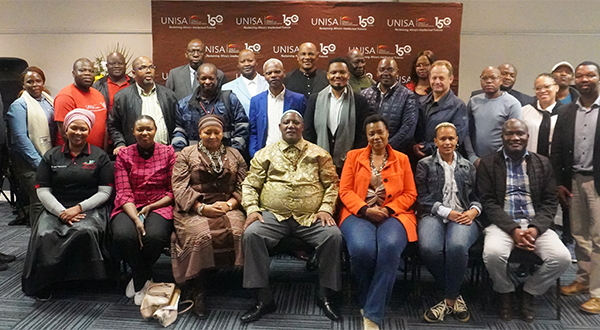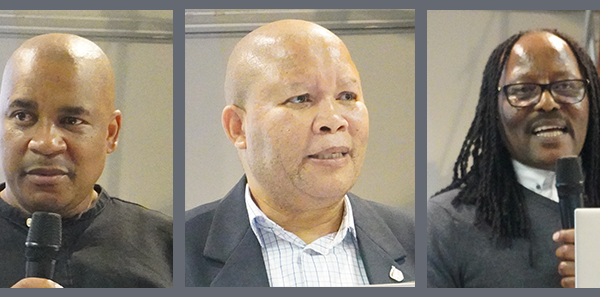College of Agriculture & Environmental Sciences
Pioneering Agriculture and Environmental Enterprise Innovation Summit hosted by Unisa
On 24 May 2024, Unisa’s College of Agriculture and Environmental Sciences proudly hosted an impactful Agriculture and Environmental Enterprise Innovation Summit at the East London Golf Club. Distinguished leaders and stakeholders from the agricultural and environmental sectors attended the event, which marked a significant step towards fostering collaboration and innovation.

Summit attendees
Representatives from Tsolo Agricultural College, Fort Cox Agriculture and Forestry Training Institute, the National Planning Commission, the Eastern Cape Development Corporation, and the Eastern Cape Department of Rural Development and Agrarian Reform were in attendance. The summit followed the recent signing of a memorandum of understanding (MoU) between Unisa and the Gompo Farmers’ Association (GFA), underscoring a commitment to advancing agricultural and environmental initiatives.
Facilitating dialogue for shared goals
Prof Linda Sibali, the School Director of Ecological and Human Sustainability at CAES, expertly led the summit as the programme director. He expressed his appreciation to all the delegates for attending the summit and to CAES, the Unisa Eastern Cape Region and the GFA for creating the opportunity for engagement on the national topic of agribusiness and the environment.

From left: Prof Linda Sibali, Motale Nkgoang and Prof Monde Ntwasa
The event opened with a warm welcome from Motale Nkgoang, Eastern Cape Regional Director, who emphasised the summit’s critical role in aligning with key national and continental initiatives, such as the National Development Plan 2030, the Africa We Want 2063 Agenda, and the UN Sustainable Development Goals (SDGs). Nkgoang, quoting EW Stuart, remarked, "Agriculture is the foundation of all other industries". He highlighted Africa's abundant resources while pointing out the persistent challenge of hunger, stating, "The summit stands as a testament to the power of collective action in addressing this critical issue".
CAES Acting Executive Dean, Prof Monde Ntwasa, outlined the summit’s objectives, expressing a strong desire for actionable outcomes. "We want clear outcomes to implement what we promised our people and to harness what we promised at the signing of the MoU," said Ntwasa. He addressed the concerning issue of job losses in the Eastern Cape, citing a recent newspaper report that over 77 000 jobs were lost between January and March 2024. He emphasised the broader impact, noting that due to extended family structures, the number of people affected is significantly higher.
In his presentation, Ntwasa elucidated the summit's primary purpose, which was to harness the ecosystem through the Quadruple Helix Model with a view to addressing unemployment and poverty, given that unemployment is the primary driver of poverty. This model emphasises sustainable industrialisation through effective partnerships among academia, government, industry and communities. He concluded by accentuating the importance of building a robust social capital and innovation ecosystem, which includes government, business communities rooted in local contexts, communities eager to progress, and academia committed to economic development. Ntwasa called for a comprehensive programme or plan of action to effectively utilise these elements.
Presentations and programmes
CAES showcased several short learning programmes designed to enhance skills and knowledge in agribusiness and environmental management. Prof Michael Antwi presented the Agribusiness Management Programme, Dr Elvis Malobane introduced the Climate Smart Agriculture Programme, and Prof Kevin Mearns detailed the Environmental Enterprises Programme.
Dr Lerato Matsunyane of the Agricultural Research Council (ARC) delivered a presentation on the ARC’s impactful work and its footprint in the Eastern Cape, highlighting the council’s significant contributions to agricultural research and development in the region.
Contributions and engagements
Sibali facilitated a robust engagement session where it was established that Unisa’s existing offerings will enable agribusiness and environmental enterprise. Attendees were tasked with discussing how to achieve several key goals, including identification of existing projects within the ecosystem, setting priorities for agriculture and environmental enterprise in the Eastern Cape, securing funding for human capacity development, and establishing an innovation ecosystem.
Chief Makinana, of the GFA, thanked Unisa for the initiative and elaborated: "I can see that this will work, and I like that we have people from different institutions, including academia, government, GFA, and other farmers’ associations."
Prof Sogolo Lebelo, the School Director of Agriculture and Life Sciences at CAES, concluded the summit by summarising the critical aspects that need immediate attention, including the Unisa training programme, the database for funders and the identification of youth for various projects within the ecosystem, and concluded with a clear way forward.
The Agriculture and Environmental Enterprise Innovation Summit marks a pivotal moment in Unisa's efforts to drive forward-thinking agricultural and environmental strategies, leveraging collective expertise and innovation to address critical socioeconomic challenges.
* By Lukhetho Mbanjwa, Intern, Eastern Cape Region, Department of Communication and Marketing, and Gugu Masinga, Communication and Marketing Specialist, College of Agriculture and Environmental Sciences
Publish date: 2024/06/25

 Unisa co-hosts G20 community outreach in the Eastern Cape
Unisa co-hosts G20 community outreach in the Eastern Cape
 Unisans gain membership of prestigious science academies
Unisans gain membership of prestigious science academies
 Advocating for disability transformation through servant leadership
Advocating for disability transformation through servant leadership
 Unisa Press continues to illuminate the publishing space
Unisa Press continues to illuminate the publishing space